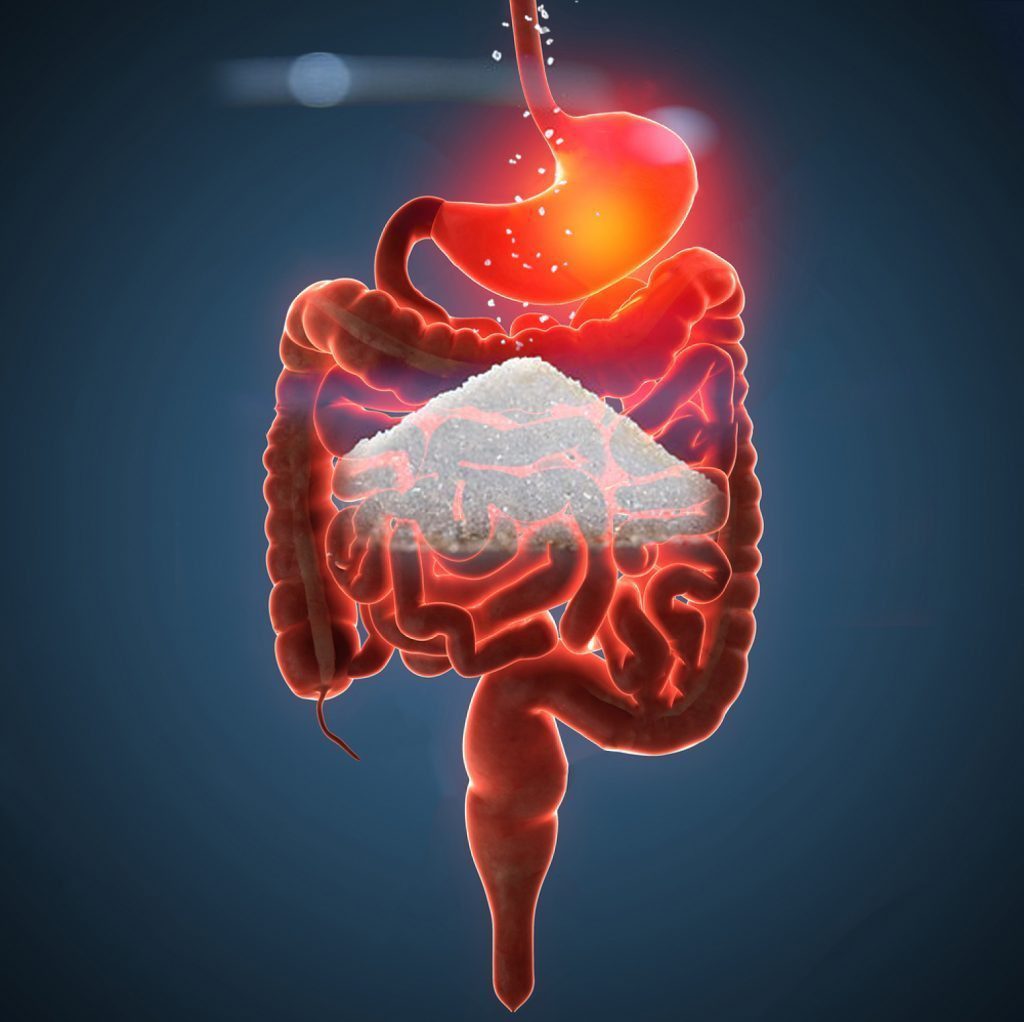El Paso, TX. Chiropractor Dr. Alex Jimenez investigates sugar, acidity and inflammation.
A study late last year, which appeared in JAMA Internal Medicine, presented a damning declaration hardly surprisingly to anyone remotely tuned in to the sugar debate recently.
Researchers here noted way back in the 1960s, the sugar industry paid three Harvard scientists to publish a study in the New England Journal of Medicine arguing fat (particularly saturated fat) and cholesterol triggered heart disease while largely exculpating sugar.(1)
Repercussions of that sugar-lobbied study resonated over the next few decades – into 2017, in fact – as low fat, cholesterol-free, and calorie counting became mantras for healthy eating.
Sugar? Well, it got a free pass as a “healthy†part of any sensible diet, whatever that meant. Meanwhile, over the ensuing decades we became fatter and sicker. And today, more experts acknowledge sugar became the chief culprit that sabotaged our health and waistlines.
Recent Studies on Sugar
Recent studies show sugar converts to belly fat, paving a nasty path for obesity — and other problems. (2) One study found just 24 teaspoons of a few sugars, including sugar from “healthy†honey and orange juice, decrease your neutrophils’ ability to destroy bacteria, thereby hijacking your immune system.(3) (A 12-ounce glass of OJ has nine teaspoons of sugar! So much for drinking OJ when you get a cold.)
Pick your poison — excess sugar probably messes with it. Consider brain health. One study found sugar triggers buildup of toxic amyloid proteins, directly responsible for dementia.(4) Another showed older adults who consumed excess sugar and other carbohydrates increased their risk for dementia compared with older adults who ate a higher-fat and protein diet.(3)
We’re eating more sugar than ever before. Between 1977-78 and 1994-96, the average American daily consumption of added sugars increased from 235 to 318 calories, an increase of 35 percent. Mostly that was due to soft drinks, the single biggest source of calories. Today, over 10 percent of Americans’ daily calories (over 55 grams, in fact) come from sugar-sweetened beverages but also grain-containing foods and fruit or fruit juice, which are essentially sugar. (5)
Today Americans eat an average of 133 pounds of sugar yearly. That doesn’t account for bagels, breads, pasta, and other starchy foods that break down to sugar. According to some experts like Dr. Mark Hyman, altogether the average American eats about a pound of sugar daily! (6, 7)
Those results, unsurprisingly, have been disastrous. In his new book The Case Against Sugar, Gary Taubes argues over-consuming the sweet stuff has created adverse metabolic and hormonal effects, predisposing us to obesity and preventable chronic diseases including cancer and Alzheimer’s disease (now referred to as Type 3 diabetes).
Anyone following the sugar debate won’t find this breaking news, although Taube’s book presents it in a more mainstream, palatable, arguably jarring light.
But how does sugar lead to obesity, Type 2 diabetes, Alzheimer’s, and pretty much any other disease on the planet? While the path isn’t necessarily linear, we can certainly trace it.
Sugar Wrecks pH Balance

Research shows an alkaline state is healthier for your body, and most tissues and cells maintain an alkaline pH balance.(8) Sugar does the opposite: It imbalances pH and makes you more acidic, increasing your risk for numerous problems including kidney stones, chronic inflammation, and oxidative stress.
The pH of your blood is tightly regulated and usually stays around 7.35 to 7.45. When experts talk about acidic or alkaline foods, they refer to your urine Ph, since blood Ph stays relatively stable. Urine pH provides clues about numerous things include cellular health and nutrient status.
However, excess sugar can lower pH between cells. Excess sugar also creates sodium and potassium imbalances, contributing to that more acidic environment. Combine that with lost calcium in the urine and decreased sodium bicarbonate (the body’s major buffer) and you’ve got a perfect recipe for metabolic acidosis.(8)
Coupled with fewer higher-alkaline foods like fruits and vegetables, your body becomes more acidic while lowering its main buffer (serum bicarbonate). Metabolic stress ensues in your liver, pancreas, kidneys, and other organs.
Studies show overall people who eat more refined sugar consume fewer fruits and vegetables, creating sodium to potassium imbalances that mess with your body’s buffering system, creating – you guessed it – an even more acidic environment between your cells.(8)
An acidic environment also stresses your body out. Sugar-triggered metabolic acidosis raises your stress hormone cortisol, keeping your body on high alert and cranking out more free radicals that damage mitochondria (your cells’ energy plants) while accelerating aging and ramping up fat storage.(9)
Acidity also flips the switch for cytokine production, spiking inflammation and free radical production. An acidic environment also stresses out your liver, kidneys, pancreas, and other organs, ramping up those inflammatory and oxidative stress pathways, damaging cells and sometimes leading to cancer. (10)
Sugar, Chronic Inflammation &Â Oxidative Stress
The acidic environment excess sugar creates contributes to two major killers that often occur together: Chronic inflammation and oxidative stress.
Chronic inflammation plays a role in every disease on the planet. Numerous culprits contribute to chronic inflammation, including insufficient sleep, lack of exercise, and stress.(11, 12)
So does sugar. Excessive amounts can also increase oxidative stress,(13, 14) creating an antioxidant imbalance that leads to metabolic damage.(15) Oxidative stress weakens your antioxidant defense, dampening your body’s ability to clean up this oxidative damage.(16)
Studies also link oxidative stress to obesity(17) and chronic diseases like cancer.(10) That particularly becomes true when you eat a diet low in omega-3 fatty acids, dietary fiber, and antioxidant-rich foods like vegetables.(18)
A Healthier You!
Sugar &Â Disease
So, sugar makes your body acidic, which increases chronic inflammation and oxidative stress, spiking obesity and nearly every disease on the planet. Consequently, obesity and disease increase chronic inflammation and oxidative stress, creating a vicious cycle.
What ensues is often catastrophic and sometimes deadly. Insulin resistance, which paves the path for Type 2 diabetes and other problems, might be sugar’s biggest culprit. Many overweight or obese people also have some form of insulin resistance, which becomes a major player for inflammation.(19)
None of this occurs in a vacuum. Metabolic syndrome – an umbrella term that affects 34 million Americans(20) and includes insulin resistance but also high blood sugar levels, hyperlipidemia, high blood pressure, weight gain, and high uric acid levels – also increases inflammation and oxidative stress.(21)
Taubes, like some other experts and recent studies, pins sugar as the chief driver for insulin resistance and metabolic syndrome.
Many studies particularly blame fructose. Yes, fruit contains fructose, but getting 15 grams of this simple sugar from an apple becomes far different than a soda. For one, that apple comes packaged with nutrients, fiber, and antioxidants that buffer its fructose load. (22, 23)
What’s Wrong With Fructose?
Ironically, fructose doesn’t raise insulin levels but contributes to insulin resistance.(24) It also depletes your main energy “currency†adenosine triphosphate (ATP), damages cells, and creates uric acid buildup (leading to gout and other problems).(25, 26)
There’s more. Fructose increases apolipoprotein B levels, creating “sticky†blood platelets that increase blood clotting, paving the way for stroke and heart attacks.(27) And it raises triglyceride levels while becoming the chief driver of non-alcoholic fatty liver disease (NAFLD).(28)
This simple sugar shuts down satiety hormones like leptin, delivering a double whammy of insulin resistance and leptin resistance.(29)
It can even make you less intelligent. A 2012 study at the David Geffen School of Medicine at UCLA showed compared with a control group, rats fed a high-fructose diet performed poorly in tests using mazes designed to observe memory and learning.(22)
Keep in mind sucrose (table sugar) breaks down to fructose and glucose, and even high-fructose corn syrup (HFCS) contains glucose. Glucose is no angel, but it behaves metabolically different and (at least compared with fructose) overall creates less damage. At the same time, eating large amounts of sugar means you’re simultaneously getting huge amounts of fructose, creating these and other problems.
Dialing Back Your Sugar Quota
Considering certain sugars (like fructose) are more damaging, and naturally occurring sugars create different effects than added sugars, the whole sugar debate can become confusing. And what does “excessive amounts of sugar†even mean?
Opinions differ, but the American Heart Association (AHA) recommends no more than six teaspoons daily for women and nine for men, while the World Health Organization (WHO) recommends no more than 10 percent (ideally less than five percent) of your calories come from added sugar or sugars like honey, syrups, and fruit juice.(27)
My own recommendations tend to be in-line with those of the World Health Organization, though I’d recommend those sugar calories only ever get into the body in the form of organic raw honey or unrefined maple syrup — if at all!
When you reduce sugar, you help restore acid-base balance and lower inflammation as well as oxidative stress, reducing your risk for obesity and chronic disease. You can’t eliminate sugar (even super-healthy foods like broccoli contain a little sugar), but you can cut back on it. Here are five ways to do that.
- Increase healthy foods.
Add before you take away: Edge out sugary foods with more nutrient-rich ones. Studies show focusing on antioxidant-rich fruits and vegetables can reverse sugar’s inflammatory response.(30) No, eating three servings of steamed broccoli doesn’t give you leeway to eat chocolate cake, but that broccoli can help minimize sugar’s impact. - Scrutinize labels.
Never mind that the front package boasts “low sugar†or whatever. The only way to really know is by looking at nutrient facts. Keep in mind that roughly four grams equals one teaspoon of sugar. Do your math and multiply accordingly. Learn the many names for sugar that hide on ingredients lists (Jonathan Bailor notes 57!) and realize manufacturers keep serving sizes incredibly small to trick you into thinking you’re eating less sugar than you actually are. - Beware of “healthy†foods and especially drinks.
A green juice or honey-sweetened bottle of green tea can have as much (if not more) sugar than a cola. Just because it gets touted as healthy or you find it in a “healthy†grocery store doesn’t make it healthy. - Remember all carbs break down to sugar.
That bag of potato chips might only contain two grams of sugar per serving, but look at the complete carbohydrate count. Something like 20 grams of carbohydrate from processed foods – meaning foods without fiber, antioxidants, or other nutrients whole foods provide – essentially break down into about five teaspoons of sugar. That’s one Let’s face it: You’ll probably eat several servings of these “trigger†foods. Proceed accordingly. - Eat real food.
Cut through the chase and simplify your eating by avoiding processed foods. Even though some whole foods contain sugar, they come wrapped in fiber, nutrients, and antioxidants that buffer out that sugar load.
Have recent studies made you rethink how much sugar you consume, particularly from sneaky sources? Does sugar rightly deserve to be demonized or are we being overly dramatic making it public enemy number one? Share your thoughts in the comments below or on my Facebook page.

About Dr. B.J. Hardick
Raised in a holistic family, Dr. B.J. Hardick is the co-author of the best-selling Maximized Living Nutrition Plans, used in natural health clinics worldwide, and a contributing author for its follow-up publication, The Cancer Killers. Dr. Hardick shares his own journey dealing with heavy metal toxicity in Real Detox, his e-Book available on DrHardick.com. An organic food fanatic and green living aficionado, all Dr. Hardick’s passions are anchored in helping others achieve ecologically sound, healthy, and balanced lives. Learn More
Named after the Developer of Chiropractic, Dr. B.J. Hardick is a second-generation chiropractor, a 2001 graduate of Life University, and has spent the majority of his life working in natural health care. Dr. Hardick is in full-time clinical practice in London, Ontario.
Outside of patient hours, Dr. Hardick is known for speaking on his natural health strategies to numerous professional and public audiences every year in the Unites States and Canada. In 2009, he wrote his first book, Maximized Living Nutrition Plans, which has now been used professionally in over 500 health clinics, alongside a follow-up publication to which he was a contributor, The Cancer Killers. Dr. Hardick serves on the advisory board forGreenMedInfo.com, the world’s most widely referenced natural health database.
All Dr. Hardick’s passions are anchored in helping others achieve ecologically sound, healthy, and balanced lives.
Post Disclaimers
Professional Scope of Practice *
The information herein on "Sugar, Acidity & Inflammation" is not intended to replace a one-on-one relationship with a qualified health care professional or licensed physician and is not medical advice. We encourage you to make healthcare decisions based on your research and partnership with a qualified healthcare professional.
Blog Information & Scope Discussions
Welcome to El Paso's Premier Wellness and Injury Care Clinic blog, where Dr. Alex Jimenez, DC, FNP-C, a board-certified Family Practice Nurse Practitioner (FNP-C) and Chiropractor (DC), presents insights on how our team is dedicated to holistic healing and personalized care. Our practice aligns with evidence-based treatment protocols inspired by integrative medicine principles, similar to those found on dralexjimenez.com, focusing on restoring health naturally for patients of all ages.
Our areas of chiropractic practice include Wellness & Nutrition, Chronic Pain, Personal Injury, Auto Accident Care, Work Injuries, Back Injury, Low Back Pain, Neck Pain, Migraine Headaches, Sports Injuries, Severe Sciatica, Scoliosis, Complex Herniated Discs, Fibromyalgia, Chronic Pain, Complex Injuries, Stress Management, Functional Medicine Treatments, and in-scope care protocols.
Our information scope is limited to chiropractic, musculoskeletal, physical medicine, wellness, contributing etiological viscerosomatic disturbances within clinical presentations, associated somato-visceral reflex clinical dynamics, subluxation complexes, sensitive health issues, and functional medicine articles, topics, and discussions.
We provide and present clinical collaboration with specialists from various disciplines. Each specialist is governed by their professional scope of practice and their jurisdiction of licensure. We use functional health & wellness protocols to treat and support care for the injuries or disorders of the musculoskeletal system.
Our videos, posts, topics, subjects, and insights cover clinical matters, issues, and topics that relate to and directly or indirectly support our clinical scope of practice.*
Our office has reasonably attempted to provide supportive citations and has identified the relevant research studies or studies supporting our posts. We provide copies of supporting research studies available to regulatory boards and the public upon request.
We understand that we cover matters that require an additional explanation of how they may assist in a particular care plan or treatment protocol; therefore, to discuss the subject matter above further, please feel free to ask Dr. Alex Jimenez, DC, APRN, FNP-BC, or contact us at 915-850-0900.
We are here to help you and your family.
Blessings
Dr. Alex Jimenez DC, MSACP, APRN, FNP-BC*, CCST, IFMCP, CFMP, ATN
email: coach@elpasofunctionalmedicine.com
Licensed as a Doctor of Chiropractic (DC) in Texas & New Mexico*
Texas DC License # TX5807
New Mexico DC License # NM-DC2182
Licensed as a Registered Nurse (RN*) in Texas & Multistate
Texas RN License # 1191402
ANCC FNP-BC: Board Certified Nurse Practitioner*
Compact Status: Multi-State License: Authorized to Practice in 40 States*
Graduate with Honors: ICHS: MSN-FNP (Family Nurse Practitioner Program)
Degree Granted. Master's in Family Practice MSN Diploma (Cum Laude)
Dr. Alex Jimenez, DC, APRN, FNP-BC*, CFMP, IFMCP, ATN, CCST
My Digital Business Card






 Again, I Welcome You.
Again, I Welcome You.
Comments are closed.